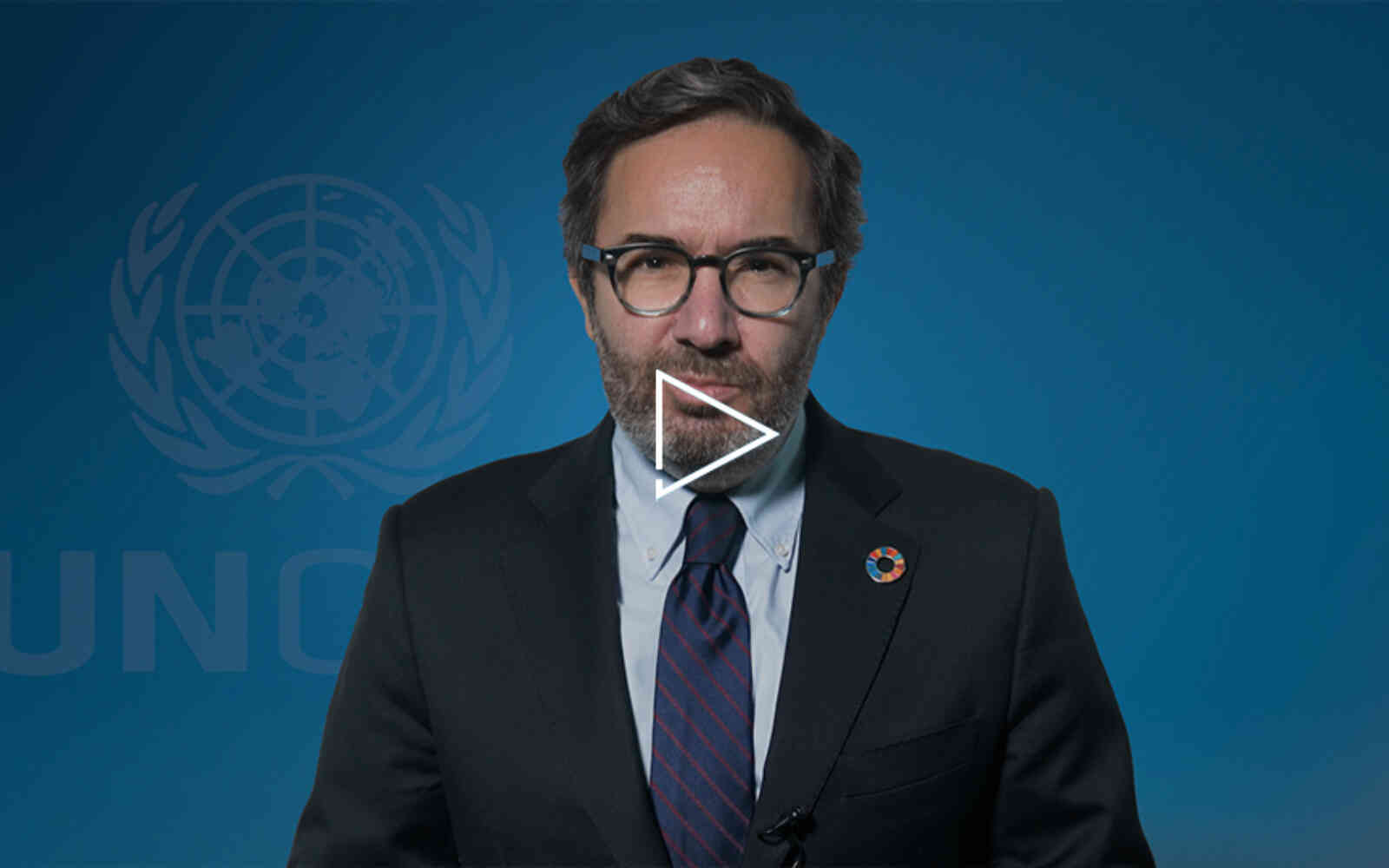The United Nations Office for Project Services (UNOPS)
Fostering Innovation and Entrepreneurship in the Euro Area
Keynote speech by Grete Faremo, Under Secretary General and Executive Director of UNOPS, at the Innovation and Entrepreneurship in the Euro Area. A joint conference by: MIT Lab for Innovation Science and Policy & European Central Bank, 14 March 2017
[Check against delivery]
Good morning. It is a great pleasure to address you this morning.
My name is Grete Faremo and I am head of the United Nations Office for Project Services. The acronym for that is UNOPS and we are headquartered in Copenhagen. We were set up some 20 years ago to be the operational arm of the UN, the agency that implements projects on behalf of – and at the request of – others.
Each year we work on some 1,000 projects in more than 80 countries. Through this, we have experience with policies and regulatory frameworks in around half of the countries of the world. With the banking systems, education levels, logistics, trust levels, and cultural conditions and restraints.
UNOPS stands out in the UN system. We are fully self-financed. We do not receive funding or grants, nor do we ask for it. We live off our competence, capacity and reputation. And we are financed by a low percentage cut on the projects we implement.
Half of our work each year is in implementing projects on behalf of other UN entities. The other half is done at the request of governments and financial institutions, such as the World Bank.
We also work with foundations and, increasingly, also with the private sector. Our engagement with the private sector is with corporations and investors who wish to invest and engage in developing countries, and who are looking for a partner to implement projects and to help mitigate potential risks.
You may wonder what the head of a UN organization that mainly works in non-OECD countries would have to say about innovation in the Euro Area. Let me explain.
And today, my message is the following: Innovation in Europe is important for Europe. But innovation in developing countries is also important. For the developing countries themselves, certainly! But indeed also for Europe!
Oddly enough, the situation of the Nordic countries can serve to illustrate this. Today, international technology platforms, often developed in big countries, form the backbone of growth, effectiveness, innovation and job creation in the Nordic countries. You have heard about Windows, Java, Red Hat etc.
-----------------------------------------------
Some years ago, I was told that Microsoft investments outside the US are higher nowhere than in the Nordic countries.
Why? Maybe because the Nordics form the best test bed for innovation efforts? Nordics have been early adopters of technology for years.
Most probably, it is also due to the high and even level of education, and technical and linguistic skills.
An effective and non-corrupt public sector allows for speedy transition from idea to implementation.
Permissions, licenses and approvals are often delivered within hours. The same procedure takes months in other cultures.
A management culture that encourages independent thinking and expression of opinions and ideas among staff removes structural obstacles to innovation.
A university – or even two like Stanford and Berkeley in California – is not in itself enough to create an environment for innovation. Nor is a government-supported innovation hub providing incubation support through grants, offices or other incentives.
Only when you get the right combination of the two, and add a policy environment that encourages entrepreneurship and investors who accept the particular risks of innovation and don't punish failure, will you get a dynamic that may work.
-----------------------------------------------
If the balance isn't right, there is a danger of wasting resources, by, for example, supporting lots of start-ups in a policy environment that hinders further growth through restrictive recruitment regulations or limits on immigration.
Let us recall that Steve Jobs father was a Syrian exile.
Let us recognize the constructive role played by many governments. Most innovation initially occurs through public universities or through government-supported programmes.
Surprisingly, the one issue that does not seem to be crucial is tax breaks. No research on the success factors for creating innovation clusters finds any significant correlation between success and lenient tax policies.
While on the surface everyone is interested in a government-supported innovation hub, it will soon become apparent that private investors and governments have different aims.
Companies want quick returns and low taxes.
Governments want stable employment and tax revenue.
Pretending that this conflict doesn't exist doesn't help anyone. Also, providing temporary tax breaks in the hope of attracting investors also tends to backfire, since technology allow start-ups, once established, to move easily. So once you end tax breaks, your investors might head somewhere else. The race to the bottom on tax incentives has proven to be a losing proposition for local and national governments everywhere.
In fact, some of the most successful clusters of innovation are in distinctly high-tax environments. Take the case of Sweden.
-----------------------------------------------
Sweden is an unlikely success story. Not only are taxes high, but Scandinavia's well-developed welfare system has been accused of not being encouraging to innovation and entrepreneurship. How wrong!
Sweden has emerged as the centre of music-related innovation and entrepreneurship. The reason for this is interesting and illustrative. It all began with the 1974 Eurovision Song Contest, that much-maligned European institution of kitsch and bad taste.
Abba's success could have been a one-hit wonder, but the very entrepreneurial people behind the group not only made Abba into one of the most successful music groups of all time, they made the foundation for a whole industry of songwriting and paved the way for a long list of Swedish groups that had global success. Roxette, Ace of Base, The Cardigans, Neneh Cherry, Swedish House Mafia; I could go on. This led again to a whole recording and music video industry growing up in Stockholm.
It didn't take long before this bubbling of creativity went digital. Kazaa, a music file sharing site, started up as an Estonian/Swedish invention. Skype came soon after. When the music industry realized it had to go digital, Sweden was very well-placed to take advantage. Spotify became the result, and later Zound Industries and Soundtrap, to mention a couple. Not to forget that a large number of American artists, such as Pink, Katy Perry and Taylor Swift, get their songs and lyrics from, yes, Stockholm.
It is difficult to put a figure on the value of music-related industries and innovation as part of Sweden's total output, but it is significant.
Sweden's example gives us two important lessons:
- There are growth opportunities even in an industry in crisis, such as the global music industry, if you are innovative enough and can get ahead of the curve; and
- If you build on and nurture a natural or historical advantage in skills or resources, your chances of creating a successful innovation cluster are significantly higher. In other words: build on what is already there.
-----------------------------------------------
And now, here's why innovation in developing countries is possible and important for everybody. Recently, we at UNOPS are developing innovation centres around the world.
Together with our global innovation partners from education, incubation, investment and government, we set up and manage Global Innovation Centres on behalf of local, regional and national stakeholders. Our partners include MIT, our co-host today. We also have Columbia University on board.
We are operating three global innovation centres in China, plus developing around 10 new global innovation centres in Dubai, Japan, Canada, Nepal, even in Caribbean island states, and we are in discussions with Pacific states that want the same things.
Today, I wanted to share with you some lessons we have learned along the way.
The starting point for anyone wanting to create an innovation centre is, of course, local. A local or national government wants to create jobs for its own population and tax revenue for itself. That is a natural and good starting point.
The driver of innovation is the free pursuit of solutions to real needs. In a globalized world, those needs are rarely limited to a local context. Moreover, the major needs of today are linked to development challenges in developing countries.
It is in Africa, the Caribbean, Latin America, the Middle East, Asia and the Pacific where innovation and leapfrogging of old technologies could make the most change for good. Increasingly, these are also the parts of the world where rapid growth markets lie. And with growth markets comes economic opportunities.
There are practically no limits to what we could do to improve the livelihoods of millions who are striving for a better life, and to whom technology could make a huge difference. And remember that many developing countries already have as many cellphones as they have people.
So just imagine how the world will change when we create smart phone apps that can register new AIDS, TB or diabetes patients and monitor their treatments.
When we enable rural farmers to get bank accounts through their phones.
When water containers can roll like wheelbarrows from well to home rather than being carried on one's head.
Or when easy-to-use computerized tax systems reduce corruption, increase tax revenue and assure taxpayers that their money is well spent.
Imagine how rural teachers can widen their students' horizons by stimulating their curiosity through accessing a universe of knowledge and learning available online!
So the first lesson is to think globally even if your starting point is local. Think about market opportunities that go far beyond your local context.
-----------------------------------------------
ICT technology is the key to scaling marketable products and services.
So what is an innovation centre and what does it take to establish one? Actually an innovation centre can start with attracting and co-locating talents and giving them broadband access, water and sanitation.
One beauty of this is that it does not require a lot of financial muscle. We connect the talents. We nurture the incubators. We even link up the universities.
And it should, at the outset, not require a lot of public sector involvement with respect to permissions or licences.
It is said that US president Eisenhower was surprized to learn that half of all Americans had less than average intelligence. Let that serve to remind us that half of the world's population has above average intelligence. There are vast human resources to tap. And knowledge is not a scarce resource. There is enough for everybody.
As connectivity opens new markets for new products, reduces waste and improves logistics, we in the developed world will increasingly see developing countries as our home markets.
The benefits will go both ways.
Ladies and gentlemen, I have mentioned some of the lessons we are taking with us when we help countries establish incubators, innovation and entrepreneurial clusters. Of course, what we bring to the table is also ensuring that any project we manage is transparent, effectively managed and has a global scope and reach.
UNOPS global innovation centres aim to establish a pioneering platform with a global, innovative operational model. We connect people and encourage knowledge sharing across public and private sector. We build into these models policies and practices that are known to stimulate innovation, good economics and growth. We focus on gender, minorities, youth and vulnerable groups. UNOPS just launched a 'Possibilities Portal' where these groups can more easily enter this great universe of innovation and test their ideas with partners.
UNOPS is willing and happy to be a partner in this endeavour.
Thank you.












